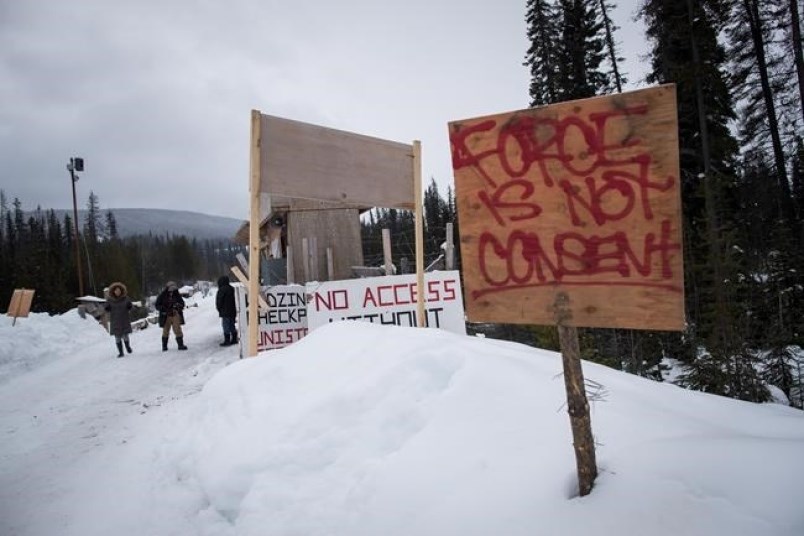Once again, a pipeline protest is about to put the B.C. NDP government in a bit of a political pickle.
And no, I am not referring to the endless debate over the Trans Mountain pipeline expansion. Instead, the energy project that is once again in the news is the Coastal GasLink natural gas pipeline that will connect to the LNG Canada terminal in Kitimat.
The company building the $6.6 billion, 670 kilometre pipeline says it has signed benefits agreements with all 20 elected First Nations councils along the line’s route. However, five unelected “hereditary chiefs” of the Wet’suwet’en First Nations oppose the project and are doing everything they can to block or disrupt its construction.
The latest move by the five chiefs (and a handful of activist supporters) was to issue this past weekend a so-called “eviction notice” to Coastal GasLink workers at a work site near the northwest community of Houston. That notice came after a B.C. Supreme Court justice extended an injunction against the pipeline protesters, barring them from blocking company workers from accessing the site.
This dispute has all the markings of a confrontation that could get out of hand very easily, and one that will put the NDP government on the spot. It is yet another issue that will remind the NDP that positions it took in Opposition are not supportable or doable once it forms government.
Already, the B.C. Liberal Opposition is demanding that Premier John Horgan fire Forests Minister Doug Donaldson, whom the party claims has expressed support for the illegal blockades in the past. Horgan is not going to do that over this issue, of course, but his rumored cabinet shuffle may lead to a change in who holds that portfolio anyways.
This is a good issue for the B.C. Liberals to hammer the NDP over. The voting public likes to see court orders enforced, and there is widespread evidence that pipeline projects (most notably the Trans Mountain one) have the support of a majority of the public.
However, a more pressing issue for the NDP government is trying to ensure the LNG Canada project gets over the finish line, while at the same time trying to walk a political tightrope when it comes to dealing with First Nations.
The LNG Canada project is a centrepiece of its long-term economic strategy and a cornerstone of its climate action plan. There are already signs the project has lit a fire under the economy of the province’s northwest communities, something badly needed as the forest industry continues to go into a tailspin.
The government will inevitably have to align itself with the company’s position, and thus will likely find itself in a very dramatic showdown with the five hereditary chiefs and their supporters. The RCMP is already involved in the situation and their presence has heightened tension at the protest camp in the past.
The tensions have split the Wet’suwet’en community, although most reports seem to indicate the protesters have the support of just a minority of the members of the 12 hereditary house groups (which in turn fall under five clans). As well, the five hereditary chiefs who oppose the pipeline have been accused of bullying three female hereditary chiefs who support the project.
This ongoing, unresolved dispute has magnified some key questions that can arise when trying to secure First Nations’ support for energy projects, such as: are elected councils the proper bodies to negotiate with, or are hereditary chiefs the ones to deal with? Moreover, if the support of most First Nations along a project’s corridor is secured, is that enough if a minority of other First Nations oppose it?
All tough questions and ones the NDP government will have to answer as it begins adhering to the United Nations Declaration of the Rights of Indigenous People, which passed into law during the last legislative session.
In this particular case, however, the NDP will have to follow the rule of law as defined by the courts. And doing that is going to be one heck of a political mess to get through.
Keith Baldrey is chief political reporter for Global BC



